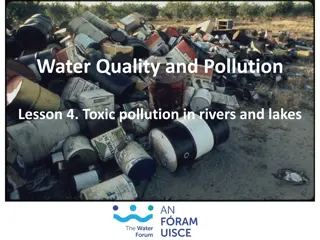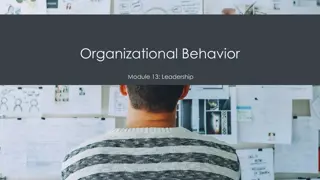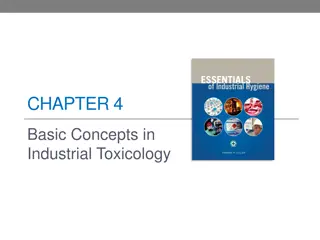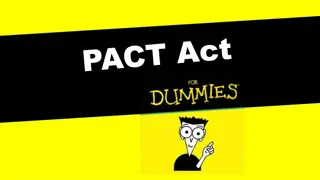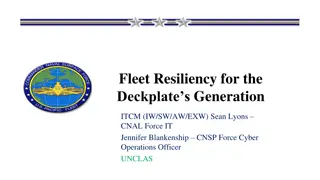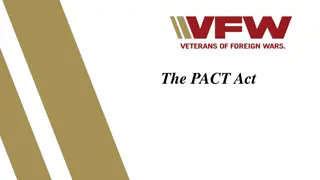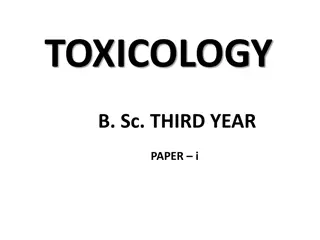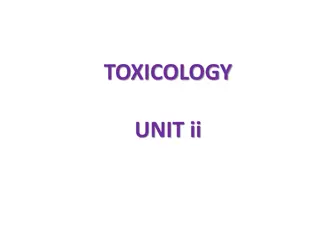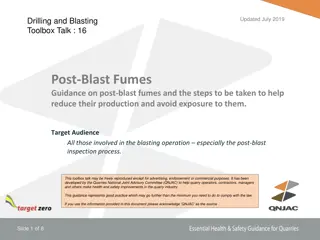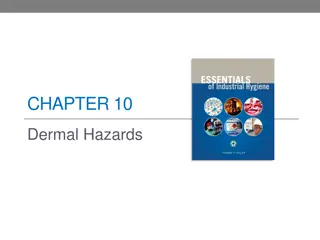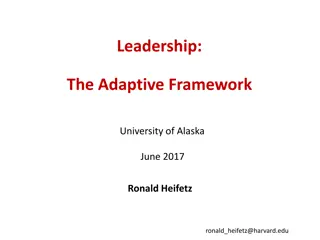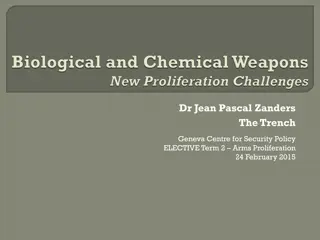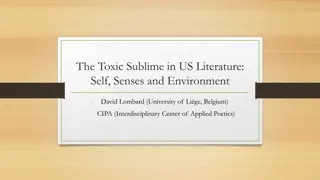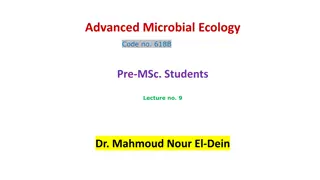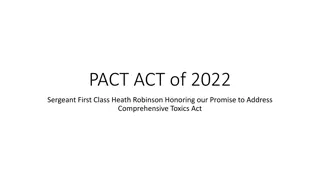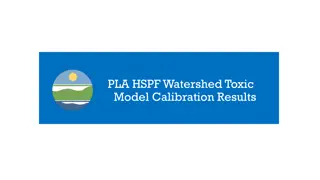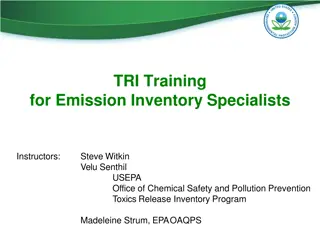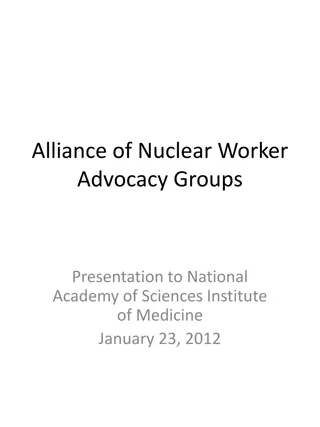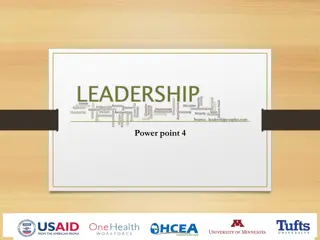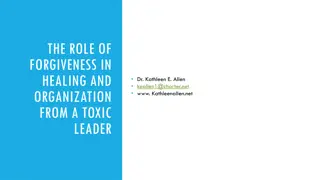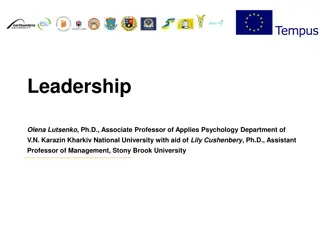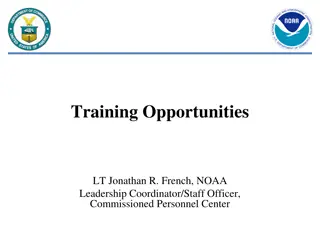Abrus precatorius
Abrus Precatorius, also known as the jequirity bean or rosary pea, is a highly toxic plant that is found throughout the tropics. Its seeds are used in jewelry and necklaces, but they can be fatal if ingested. This article explores the distribution, toxic principle, animals affected, mechanism of tox
18 views • 23 slides
Unveiling the Leadership Beatitudes: A Workshop on Servant Leadership
Delve into the essence of servant leadership through "The Joy of Leadership: Leadership in the League" workshop. Explore the Beatitudes of a Leader, reflect on the power of prayer in leadership, and learn to let your light shine in serving others. Discover how to embrace your unique gifts to fulfill
0 views • 34 slides
Middle Leadership Programme (MLP)
The Middle Leadership Programme (MLP) is an online self-directed program supported by blended learning approaches. It focuses on Leading the Function behaviors in the NFCC Leadership Framework and consists of four modules covering different areas. It complements existing development programs and ali
1 views • 18 slides
Understanding Feminism, Sexism, and Toxic Masculinity - A Reflection on Gender Equality
Explore the concepts of feminism, sexism, and toxic masculinity through activities and discussions, challenging misconceptions and promoting gender equality. Reflect on learning and origins of misconceptions to foster a more inclusive society.
0 views • 7 slides
Understanding Toxic Pollution in Rivers and Lakes
Toxic pollution in rivers and lakes is a pressing environmental issue caused by various pollutants such as metals, pesticides, chemicals, and microbial contaminants. These pollutants can have detrimental effects on aquatic life, human water use, and health. Learn about the impact of toxic pollutants
2 views • 20 slides
Understanding Leadership: A Comprehensive Overview
Explore the realm of leadership in organizational behavior through topics like recognizing good and poor leadership, the history of leadership theories, and the distinction between leadership and management. Dive into the evolution of leadership approaches, from early trait theories to behavioral an
2 views • 31 slides
Understanding Basic Concepts in Industrial Toxicology
Industrial toxicology is a vital field that studies the effects of various agents on organism health through mechanisms of action, toxicokinetics, and more. It explores toxic chemical absorption, distribution, metabolism, and elimination, as well as toxic effects on major organ systems. Learn about
0 views • 35 slides
Expansion of Health Care Eligibility for Toxic-Exposed Veterans
This Title expands the eligibility criteria for Toxic-Exposed Veterans in 38 U.S.C. 1710 by refining the definition of Vietnam-era herbicide-exposed veterans to include those who performed covered service in specified locations. It introduces three new categories of eligible veterans based on toxic
1 views • 19 slides
Challenges and Solutions in Fleet Resiliency for the Deckplate's Generation
Fleet resiliency for the deckplate's generation faces training gaps, barriers, motivation battles, and toxic leadership issues. Lack of foundational skills and reliance on technical documentation hinder self-sufficiency. Toxic leadership and communication barriers impact motivation and retention. De
2 views • 9 slides
Urea Biosynthesis and the Krebs-Henseleit Cycle in the Liver
Urea is synthesized in the liver through a series of enzymatic steps known as the urea cycle or Krebs-Henseleit cycle. This process involves converting toxic ammonia into urea, a less toxic and water-soluble compound that can be easily excreted in urine. The liver plays a crucial role in urea biosyn
1 views • 20 slides
Exploring Leadership Theories: Traits and Behaviors
Leadership theories have evolved from trait theory focusing on personal qualities to behavioral theories emphasizing actions and interactions. While early research sought universal traits for leadership, it encountered challenges due to varied traits among leaders and non-leaders. Behavioral theorie
2 views • 29 slides
Understanding The PACT Act and Its Impact on Veterans
The PACT Act, named after Sgt. First Class Heath Robinson who succumbed to lung cancer from toxic exposure, is a law enhancing VA benefits for veterans exposed to harmful substances. It expands VA health care eligibility, ensures toxic exposure screenings, and mandates research studies on veteran he
0 views • 24 slides
Introduction to Toxicology: Science and Impact on Living Organisms
Toxicology is the study of adverse effects of chemicals on living organisms. It assesses probability of occurrence, quantitatively and qualitatively analyzing toxic effects. Toxicants are agents causing harmful responses in biological systems. Environmental toxicology focuses on pollutants' effects
0 views • 12 slides
Overview of Toxicology: Understanding Chemical Risks and Health Impacts
Toxicology is a crucial field that assesses the effects of various toxic substances on human health and the environment. From heavy metals to solvents, radiation, pesticides, and animal toxins, this discipline plays a vital role in identifying and managing risks associated with exposure to harmful c
0 views • 25 slides
Army Leadership Doctrine Update: ADP 6-22.1 Highlights
New Army Doctrine Publication (ADP) 6-22.1, "Army Leadership and the Profession," emphasizes the foundational principles of leadership with updated content and guidance. It covers essential leadership traits, values, competencies, and behaviors, providing insights into effective leadership practices
1 views • 6 slides
Dynamic Inspiration: Developing Leadership at 2015 National Order of the Arrow Conference
Welcome to the 2015 National Order of the Arrow Conference focusing on Dynamic Inspiration and Developing Leadership. Join us to explore the essence of leadership, from defining it in a word to ranking its attributes. Discover the significance of good and bad leadership, leading by example, and buil
0 views • 8 slides
Post-Blast Fumes: Guidance on Mitigating Toxic Gases in Drilling and Blasting Operations
Explosives used in blasting operations generate post-blast fumes, which can contain toxic gases like oxides of nitrogen (NOx) and carbon monoxide. This toolbox talk provides guidance on reducing fume production and avoiding exposure, with a focus on the physiological effects of different gas compone
0 views • 11 slides
Leadership Insights and Lessons for Ethical Leadership
Explore valuable insights on leadership, ethical values, and servant leadership principles shared by Dr. Castruita. The content covers topics such as developing a strong personal character, promoting a culture of responsibility, and serving others with humility and integrity. Gain knowledge on remov
0 views • 9 slides
GwE NPQH Development Programme - Aspiring Headteachers Leadership Pipeline
Focusing on fostering aptitude and aspiration in aspiring Headteachers, the GwE NPQH Development Programme aims to build a first-class leadership pipeline for outstanding school leadership. Through experiential learning, group interaction, and personal reflection, participants explore key themes in
0 views • 4 slides
Understanding Dermal Hazards: Anatomy, Toxic Absorption, and Health Effects
Explore the key anatomy and physiology of the skin, learn how toxic agents are absorbed, understand the adverse health effects of skin exposure to hazardous agents, discover methods of dermal exposure assessment, and develop controls to minimize skin exposure to dangerous substances.
0 views • 26 slides
Understanding Leadership: Key Concepts and Differentiation
Leadership, as explained by Ronald Heifetz, goes beyond personal traits and authority. It involves problem-solving and capacity-building in a dynamic world. The distinction between leadership and authority is crucial, emphasizing leadership as a practice rather than a set of inherent characteristics
0 views • 83 slides
Understanding Chemical and Biological Weapons Proliferation Risks
Exploring the risks associated with chemical and biological weapons proliferation, covering topics such as war scenarios, terrorism, dual-use issues, international conventions, and emerging threats. This includes discussions on the use of toxic chemicals in various settings, along with examples of p
0 views • 8 slides
Exploring the Toxic Sublime in US Literature
Investigating the aesthetic dimensions of Thoreau's environmental philosophy and its capacity to blur boundaries between natural and technological landscapes, David Lombard's research delves into the concept of the toxic sublime in literature. By redefining the sublime for the Anthropocene era, the
0 views • 10 slides
Understanding Heavy Metals and Their Impact on Organisms in the Environment
Heavy metals, such as zinc and copper, persist in the environment posing health risks to organisms. Industrial activities release toxic metals into water sources. Microorganisms can interact with heavy metal ions, altering their toxicity and resistance. Essential heavy metals are needed in small amo
0 views • 24 slides
Leadership and Management Insights: Skills, Traits, and Theories
Explore the key differences between leadership and management, uncover the essential skills and qualities of effective leaders versus managers, and delve into various leadership theories such as Trait Theory and Situational/Contingency Models. Discover the fundamental aspects and techniques of leade
0 views • 39 slides
Developing PE Subject Leadership Course Overview
This course aims to enhance subject leadership skills in Physical Education, focusing on leadership development, exploring the role of subject leaders, and improving outcomes for pupils. Participants will reflect on their leadership stage, revisit the core purpose of subject leadership, and develop
0 views • 49 slides
PACT ACT of 2022: Addressing Comprehensive Toxics Exposure for Veterans
The PACT ACT of 2022, spearheaded by Sergeant First Class Heath Robinson, aims to address comprehensive toxics exposure issues for veterans. The bill includes provisions such as expanded healthcare, improved VA services, recognition of burn pit exposure, enhancement of compensation for Persian Gulf
0 views • 22 slides
If you are looking for Gel X in Los Altos Hill
If you are looking for Gel X in Los Altos Hill, 4hands Beauty is the first clean and non toxic nail salon in North Los Altos! We don't use acrylic and other harsh materials in our work, so there is no harmful evaporations and toxic smell in our salon
0 views • 6 slides
International Leadership Symposium Highlights and Insights
This overview captures the essence of the International Leadership Symposium featuring key figures like Brian Serafini and Joanne Robinson. The symposium addresses crucial topics such as leadership skills, questions for school leadership associations, and the importance of forming leadership network
0 views • 28 slides
Comprehensive Overview of Leadership Theories and Styles
Leadership encompasses the ability to influence a group towards achieving goals by knowing oneself, communicating vision, building trust, and taking effective action. Various leadership styles include Autocratic, Democratic, Free-Rein, and Paternalistic, each with distinct decision-making approaches
0 views • 19 slides
The Importance of Women Leadership in Higher Education
Leah Busam, a leader and professional, emphasizes the significance of women in leadership roles in universities. The content discusses the underrepresentation of women in key positions, highlighting the need for greater female participation in leadership. It showcases statistics on women's enrollmen
0 views • 22 slides
PLA HSPF Watershed Toxic Model Calibration Results Summary
This summary provides insights into the calibration results of the PLA HSPF Watershed Toxic Model. It includes information on the Green/Duwamish River sub-watersheds, estimated loads to LDW toxic load reach 604, and the statistical calibration targets for HSPF toxic simulations. The calibration sequ
0 views • 10 slides
Understanding Toxics Release Inventory (TRI) Program
Toxics Release Inventory (TRI) program is a reporting system that tracks the waste management of toxic chemicals posing threats to human health and the environment. It was created in response to tragic incidents like the Bhopal disaster, aiming to provide information on toxic releases from industria
0 views • 26 slides
Alliance of Nuclear Worker Advocacy Groups Presentation on Toxic Substances Exposure
Presentation by Alliance of Nuclear Worker Advocacy Groups addressing the need to develop a matrix of toxic substances and related diseases to facilitate timely compensation for DOE workers. Emphasizes the importance of thorough documentation and recognition of exposure risks. Discusses applicable l
0 views • 10 slides
Exploring Effective and Ineffective Leadership Qualities in One Health Leadership
In the world of One Health leadership, the focus is on graduating multidisciplinary teams that can initiate shared visions and inspire across sectors. This involves fostering teamwork, professionalism, and emotional intelligence. Activities include identifying admirable and ineffective leaders, disc
0 views • 46 slides
Managing Toxic People in Your Organization
Understanding the three types of individuals - wise, foolish, and evil - can help you identify and handle toxic people effectively. Limit your interactions with foolish individuals, remove toxic people completely, and surround yourself with wise individuals to build a healthy organizational culture.
0 views • 8 slides
Understanding Leadership: Qualities, Experiences, and Discussions
Explore the concepts of leadership through discussions on qualities, experiences, and famous leaders. Reflect on the differences between good and toxic leadership while considering the nature of leadership development and gender roles in leadership.
0 views • 11 slides
The Role of Forgiveness in Healing and Organization Recovery from Toxic Leadership
Toxic leaders can leave lasting damage in organizations even after they are gone. Forgiveness plays a crucial role in healing individuals and the organization as a whole. It is an internal choice that allows for the transformation from passive hope to active hope. Creating conducive conditions for f
0 views • 13 slides
Understanding Leadership Theories and Styles
Leadership involves influencing a group towards a common goal. Traits, interaction styles, and group dynamics play vital roles in effective leadership. Various theories, such as Trait Theories and Synthetic Leadership Theories, provide insights into different aspects of leadership. Understanding lea
0 views • 41 slides
Leadership Training Opportunities for NOAA Personnel
Explore various training programs available for NOAA personnel, including Basic Officer Training Course (BOTC), Leadership Development, and Operational Leadership Training. Discover the importance of leadership skills, military protocol, and NOAA Corps heritage in equipping officers for their roles.
0 views • 16 slides




